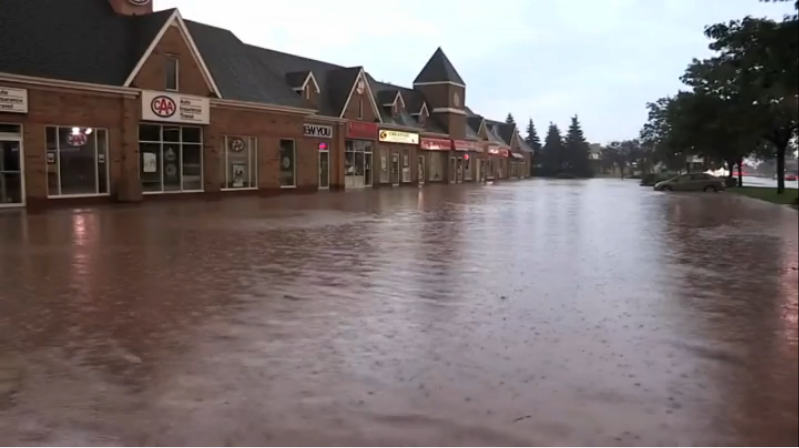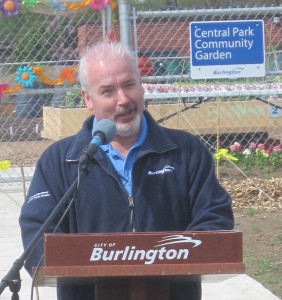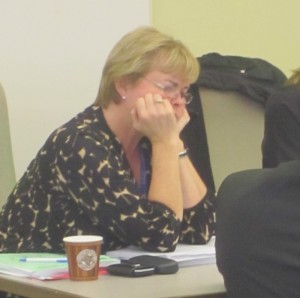November 23, 2015
BURLINGTON, ON
Storm water management began getting all kinds of attention soon after the floods of 2014 but it had been on the city’s radar screen well before that.
Former city manager Jeff Fielding had some ideas that would have resulted in a separate corporate entity that would have managed storm water and create a new revenue opportunity for the city – but that didn’t even get off the ground.

The plaza and mall operators can expect to see a significant tax added to their operating costs – the smarter ones will begin looking for remedies.
While Burlington was spending millions getting an understanding on why so much damage was done –other municipalities were developing plans to collect revenue for a problem that was now being looked at by everyone.
At the Budget review meeting held last week Councillor Lancaster asked how Waterloo handled storm water and was told that they had done a lot of public engagement and had a program that offers a credit of up to 45% of the stormwater utility fee for properties that manage their stormwater.
Residential stormwater management techniques can include rain barrels, trees, cisterns, infiltration measures or rain gardens.
Burlington has yet to create a program to collect any revenue but it is very clear that such a fee is coming our way.
Lancaster wanted to see incentives for people and a program that was easy to administer.
On Friday a group of insurance executives and senior people from Ontario municipalities met at the Royal Botanical Gardens to hear what the insurance industry was thinking and learn what some municipalities were doing.

A storm water management tax is going to hit the bottom line of the malls – might result in significantly different parking lost designs as well. Could Burlington have become a leader in this field.

The mall operators will never put in parking meters but they will be thinking through how to redesign their parking lots to limit the damage storm water does on large space with no effective way for water to run off.
There is certainly going to be a fee. The figure of $50 to $100 was mentioned for the average household with everything being based on how much ground there was.
The focus was not on just what a homeowner would have to pay- those with large parking lots are the ones going to take the hardest hit.
That includes the large malls who will have to build the tax into their cost of doing business. Places of worship that have large parking lots are going to have to find a way to pay a tax as well. Traditionally churches have been exempt from taxes. Those days appear to be coming to an end.
The stormwater credit program in Waterloo is available for commercial, industrial, institutional and multi-residential properties, based on the stormwater quality, quantity and education measures in place.
The good people of Burlington can expect to see something come out of city hall on how storm water management is going to be paid for early in the New Year.
Exactly who will manage the program and where the leadership will come from isn’t at all clear.

City General Manager Scott Stewart will be taking his smile and his skill sets to Guelph. we are losing a good one.
Earlier this month general manager Scott Stewart gave his resignation to the city manager and will take up the job of Deputy CAO of Infrastructure, Development and Enterprise Services in Guelph; he begins that job December 7th.
Stewart had been in the running for the job of city manager for Burlington twice – he was passed over both times and decided it was time to move on. There was a time when Burlington had three general managers – come December we will not have any – everything will land on the desk of James Ridge who took up the job late in March.
The management team below General manager has also seen a number of changes.
That roster currently includes:
Mike Spicer – Director of Transit
Cathy Robertson – Director Roads and Parks Maintenance
Nancy Shea Nicol – Director of Legal Services and city solicitor.
Joan Ford – Director of Finance
Bruce Zvaniga was the Director of Transportation – Vito Tolone is currently serving as the interim Director.
Chris Glenn – Director Parks and Recreation
Sheila Jones – City Auditor
Christine Swenor – Director of Information |Technology Services
Bruce Krushelnicki was Director Planning and Building – he has been replaced by Mary Lou Tanner.
Alan Magi runs Capital Works
Roy Male ran Human Resources for years – he retired and was replaced by Laura Boyd.

Joan Ford, the city’s Director of Finance knows where every dollar comes from and where every dollar gets spent.
The only person who could move into the role of a General Manager would be Joan Ford who does a superb job at finance. She is backed up by a solid team.
James Ridge has his work cut out for him. He has a number of messy files on his desk – none that he created – just past problems that are not going to go away. He has a Strategic Plan that has to be completed; his work plan has about 50 blank spots in it – no reflection on his management ability – he needs to know what Council is going to approve in the way of a Strategic Plan before he can know what he has to do.
Ridge’s biggest task is going to be creating the team that will work with him to move the city forward. The completion of the Official Plan Review is also in the wings. That work was progressing quite well – it has been moved to the back burner while Council focused on the Strategic Plan.
Then it got brought forward again – to the surprise of the Planner working on the file who was left with the impression that it had to be done quick quick quick.
Official Plans don’t lend themselves to quick quick quick.
Andrea Smith has been doing a superb job – better guidance on time lines and where the development of the plan fits into the bigger picture is what she needs most.
If you’re getting the impression that there is a little disarray at the most senior level at city hall you are more right than wrong.

Municipal^pal civil servants are for the most part dedicated innovative people who work hard. They need an environment in which they can excel.
The municipal world works at a pace that is significantly different than the private sector. There are some exceptional people who work within the municipal sector – they are creative, innovative and genuinely want to make the cities they work for better places to live. But they have to be led and Burlington has had some challenges at this level.
The current city council is not of one mind. There are very distinct differences between members of Council; there are council members who have been at the table far too long and solid strong leadership from the person who wears the chain of office just isn’t there.
Every member of the current Council was re-elected in 2014. The taxpayers now have to settle for what they chose. And get used to the idea of an additional tax they will have to pay.
















